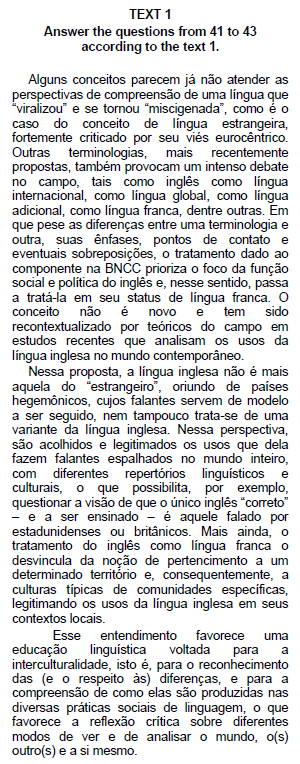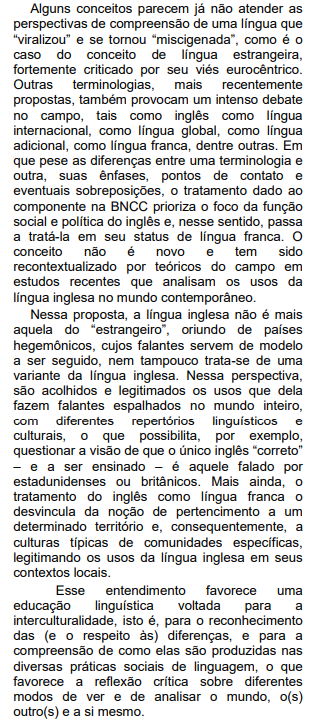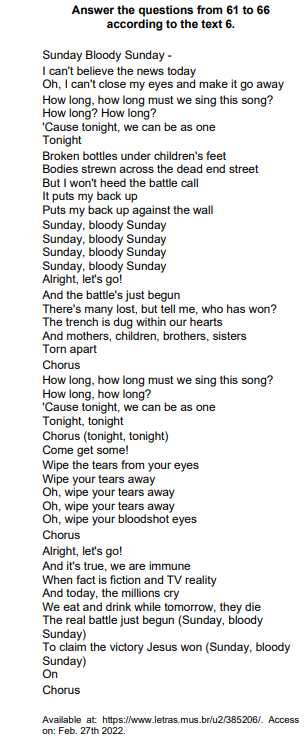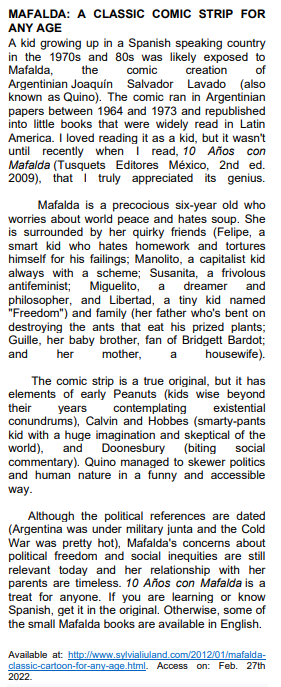Sobre metodologias ativas e integradoras, é correto afirmar que
O Currículo de Referência de Mato Grosso do Sul, em consonância com a BNCC, reconhece e preconiza a educação integral. Sobre a educação integral, assinale a alternativa correta.
Sobre estratégias de metodologias ativas, relacione as colunas e assinale a alternativa com a sequência correta.
1. Aprendizagem Baseada em Problemas.
2. Aprendizagem Baseada em Projetos.
3. Sala de Aula Invertida.
4. Grupos Cooperativos.
5. Role Playing.
6. Experimentação Investigativa.
( ) Tem seu início ao apresentar um problema aos alunos, promovendo os questionamentos iniciais e as primeiras formulações de hipótese. Em seguida, há o momento do experimento.
( ) O aluno estuda previamente o assunto e, durante a aula, o professor media discussões, esclarece as dúvidas e propõe atividades práticas.
( ) Caracteriza-se por ser um processo ativo, cooperativo, integrado e interdisciplinar e orientado para a aprendizagem dos alunos que tomam decisões, agem sozinhos e em equipe.
( ) Permite que os estudantes se relacionem com seus pares e possam referenciar-se no outro, diferenciar-se, opor-se e, assim, transformar e ser transformado na construção do próprio conhecimento.
( ) O método consiste em construir situações de ensino que promovam uma aproximação crítica do aluno com a sua realidade.
( ) Trata-se de um jogo de interpretação de papéis em que um responsável (narrador ou mestre) conta uma história e os personagens são interpretados pelos alunos, criando um texto espontâneo em que não há vencedores ou perdedores.
O texto a seguir refere-se às questões de 1 a 11.
A MODA DA HONESTIDADE E MORALIDADE
Isnar Amaral
Cria-se tanta moda neste planeta, umas até bastante estranhas, mas acabam caindo no gosto das pessoas. Ora, segundo definição em estatística, moda é o valor, conjunto de dados ou comportamentos que ocorrem com maior frequência, o que é comum para a maioria.
Então, com base neste conceito, ocorre-me uma inspiração que poderia mudar as atitudes deste país a partir das crianças. Sim, a partir delas já, pois a grande maioria já escolhe as marcas e os modelos do que quer usar ou ganhar, influenciada pela ação profissional dos marqueteiros. As mais diversas mídias criam e mudam conceitos a partir da insistência de divulgação, sendo, ao mesmo tempo, uma ferramenta e uma arma. Em dado período, a música sertaneja era coisa de “grosso”, porém bastou acrescentar a palavra “universitário” para cair no gosto da grande maioria, criando, assim, uma moda.
Por que não criar a moda do honestamente correto, do moralmente correto, do humanamente correto e do saudável? Com certeza, o surgimento de um movimento neste sentido seria de eficácia extraordinária, pois a moda é uma onda que se alastra com velocidade extrema. Se esta iniciativa fosse implantada por meio da educação escolar, talvez provocasse algum efeito daqui a dezenas de anos. Se fosse lançada como moda, no mesmo ano a grande maioria das pessoas entraria em ressonância. Seria a arrancada para a criação de uma sociedade mais correta e justa, pelo simples fato de que todos querem andar na moda.
Os grandes criadores de moda e de comportamentos têm este poder, basta querer e colocar em prática. A questão toda é se isto interessa a alguém e de que modo pode gerar lucros. A “nova moda” agregaria um aliado na nossa atividade profissional – que é criar ambientes propícios para a saúde física, mental e financeira às pessoas e empresas. A nossa atuação tem como mote eliminar nocividades dos ambientes residenciais visando à manutenção da saúde dos ocupantes e realinhar a energia dos ambientes empresariais em prol do pleno desenvolvimento do negócio, sempre considerando a honestidade, a moralidade e o ambientalmente correto. Pessoas saudáveis e empresas de sucesso são os nossos objetivos, a partir dos seus ambientes.
Pode ser um devaneio, mas como tudo o que se cria parte de um sonho, uma ideia ou pensamento, não seria esta a forma mais imediata para mudar o ambiente de um país de espertos em causa própria? [...]
Adaptado de: https://www.portaldenoticias.com.br/noticia/4761/opiniao-a-moda-da-honestidade-e-moralidade.html. Acesso em: 24 fev. 2022
A partir da leitura do texto, assinale a alternativa correta.
O texto a seguir refere-se às questões de 12 a 17.
ENTREVISTA COM O PROFESSOR, EDUCADOR E FILÓSOFO MARIO SERGIO CORTELLA
Cada vez mais a aprendizagem ocorre fora do espaço escolar. O que é preciso fazer para conquistar o aluno quando tudo fora da escola parece mais interessante?
Vou te dizer uma coisa que parece óbvia: Ninguém deixa de se interessar por aquilo que interessa. Nós temos de saber o que interessa ao aluno para, a partir daí, chegar ao que é necessário. É preciso conhecer o universo circunstancial dos alunos: as músicas que eles estão ouvindo, o que estão assistindo de programas e vendo de desenho animado, para chegar à seleção do conteúdo científico necessário. Temos de partir do universo vivencial que o aluno carrega para chegar até aquilo que de fato é necessário acumular como cultura produzida pela humanidade. Hoje, a escola não pode ser extremamente abstrata, como no meu tempo. O conteúdo tem de ser conectado com o dia a dia.
[...]
Conversando com pais e professores, a impressão é de que estão insatisfeitos. As famílias se queixam das escolas e as escolas, dos pais. O que acontece?
Antes de mais nada, não estamos diante do crime perfeito, em que só há vítimas. Temos autor também. E essa autoria é multifacetada. A escola foi soterrada nos últimos 30 anos com uma série de ocupações que ela não dá conta – e não dará. Em uma sociedade em que os adultos passaram a se ausentar da convivência com as crianças, seja por conta do excesso de trabalho, da distância nas megalópoles ou da falta de paciência para conviver com aqueles que têm menos idade, a escola ficou soterrada de tarefas. A escola passou a ser vista como um espaço de salvação.
[...]
Adaptado de: https://colegiopalavraviva.com.br/entrevistas/entrevista-com-o-professor-educador-e-filosofo-mario-sergio-cortella/. Acesso em: 24 fev. 2022.
Em “As famílias se queixam das escolas e as escolas, dos pais.”, qual é a função da vírgula?
O texto a seguir refere-se às questões de 12 a 17.
ENTREVISTA COM O PROFESSOR, EDUCADOR E FILÓSOFO MARIO SERGIO CORTELLA
Cada vez mais a aprendizagem ocorre fora do espaço escolar. O que é preciso fazer para conquistar o aluno quando tudo fora da escola parece mais interessante?
Vou te dizer uma coisa que parece óbvia: Ninguém deixa de se interessar por aquilo que interessa. Nós temos de saber o que interessa ao aluno para, a partir daí, chegar ao que é necessário. É preciso conhecer o universo circunstancial dos alunos: as músicas que eles estão ouvindo, o que estão assistindo de programas e vendo de desenho animado, para chegar à seleção do conteúdo científico necessário. Temos de partir do universo vivencial que o aluno carrega para chegar até aquilo que de fato é necessário acumular como cultura produzida pela humanidade. Hoje, a escola não pode ser extremamente abstrata, como no meu tempo. O conteúdo tem de ser conectado com o dia a dia.
[...]
Conversando com pais e professores, a impressão é de que estão insatisfeitos. As famílias se queixam das escolas e as escolas, dos pais. O que acontece?
Antes de mais nada, não estamos diante do crime perfeito, em que só há vítimas. Temos autor também. E essa autoria é multifacetada. A escola foi soterrada nos últimos 30 anos com uma série de ocupações que ela não dá conta – e não dará. Em uma sociedade em que os adultos passaram a se ausentar da convivência com as crianças, seja por conta do excesso de trabalho, da distância nas megalópoles ou da falta de paciência para conviver com aqueles que têm menos idade, a escola ficou soterrada de tarefas. A escola passou a ser vista como um espaço de salvação.
[...]
Adaptado de: https://colegiopalavraviva.com.br/entrevistas/entrevista-com-o-professor-educador-e-filosofo-mario-sergio-cortella/. Acesso em: 24 fev. 2022.
Sobre as expressões “universo circunstancial” e “universo vivencial” presentes no texto, assinale a alternativa correta.
De acordo com a Lei nº 14.113/2020, que regulamenta o Fundo de Manutenção e Desenvolvimento da Educação Básica e de Valorização dos Profissionais da Educação (Fundeb), para efeito da distribuição dos recursos dos Fundos, será admitida a dupla matrícula dos estudantes
A Deliberação CEE/MS nº 10.814, de 10 de março de 2016, que estabelece normas para a educação básica no Sistema Estadual de Ensino de Mato Grosso do Sul, em relação à classificação, que é o posicionamento do estudante em ano escolar equivalente a seus conhecimentos, experiências e desempenhos adquiridos por meios formais e informais, determina que

Brasil. Ministério da Educação. Base Nacional Comum Curricular. 2017. Adaptado.
The third paragraph

Brasil. Ministério da Educação. Base Nacional Comum Curricular. 2017. Adaptado.
According to the second paragraph and to your previous knowledge about the topic, consider the statements:
I. Teaching is an interactive and non-negotiable process.
II. The assessment is important because it provides information that supports decisions to be made regarding content, methods and objectives.
III. The assessment must be continuous and systematic.
IV. The assessment must offer a quantitative view of the knowledge built.
The correct statements are found in:
TEXT 5 Answer the questions from 54 to 60 according to the text 5.
Ukraine-Russia War: Impact on Gas, Stocks, Inflation and the US Economy
Stock prices rebounded Friday, but the invasion of Ukraine could bring about many disruptions to the US economy.
Russia's invasion of Ukraine intensified on Saturday as troops continued to march on the capital Kyiv, which has instituted a citywide curfew from 5 p.m. local time Saturday until 8 a.m. Monday. US defense officials report that Russian troops launched more than 250 missiles at Ukraine Saturday but have been slow to advance on Kyiv, per ABC News. The attacks have virtually shut down shipping in Ukraine, a country with massive agricultural production, particularly corn and wheat. Russia and Ukraine are also major suppliers of metals and other industrial commodities, while Russia is one of the world's largest oil and gas producers. The invasion not only has ramifications for political stability in Europe and around the world, it's also straining a global economy already weakened by inflation, rising energy prices, the ongoing COVID-19 pandemic and a constrained supply chain. Here's how Russia's attacks on Ukraine, and the resulting economic sanctions from the West, are affecting Americans and people around the world.
Gas and oil prices on the rise
Russia's invasion of Ukraine has caused global energy prices to spike, with crude oil rising Thursday above $105 a barrel for the first time since 2014. The price cooled down a bit later on Thursday and Friday, and currently sits around $92.50 a barrel, according to OilPrice.com. Per AARP, the average price of gas in the US on Saturday was $3.60 a gallon, up slightly from $3.57 on Friday. Russia is one of the world's largest producers of crude oil and natural gas, providing roughly 40% of the European Union's gas. Sanctions from the West could affect access to that supply, especially with Germany putting a halt to the Nord Stream 2 pipeline that was intended to bring natural gas from Russia to the EU via the Baltic Sea.
Continued inflation
Russia is the largest exporter and second-largest producer of palladium, a metal used in mobile phones, automotive exhaust systems, fuel cells and even jewelry and dental fillings. Rising prices of palladium and other essential metals could lead to price increases for manufacturers and, ultimately, consumers. "We could see a new burst of inflation," the American Enterprise Institute's Christopher Miller told The New York Times.
[...]
More cyberattacks
The US Departments of Treasury and Homeland Security have both sounded the alarm over possible cyberattacks on US banks, hospitals, government offices and power grids in retaliation for sanctions against Moscow. On Thursday morning local time, websites for the Ukrainian cabinet and foreign affairs and education ministries were all experiencing disruptions. Herbert Lin, senior research scholar at Stanford's Center for International Security and Cooperation, told the Atlantic's Rachel Gutman that the Russians have elevated cyberattacks to an "art form." Though US banks have been heightening their defenses, Lin added, utilities in larger cities might be more at risk because they lack the extra funding for cybersecurity. Lin discouraged a panicked response by everyday Americans but said having extra cash and a go bag might not be a bad idea. He underscored that those items should always be in place regardless.
Rising food prices
Food prices have already gone up in the US and abroad, and the dent in wallets could get bigger with the Russian invasion. Ukraine is one of the top five corn exporters in the world, trading some 35.9 million metric tons in 2019 alone. An extended open conflict would likely see prices go up in Europe, not just for corn itself but also for related goods, including cooking oil, corn syrup and livestock feed. Soybean prices have also surged in the US in recent months, following an unusually poor crop in South America.
If US farmers have to make up the difference in both corn and soybeans, which compete for land, prices for both crops will likely rise in the United States, as will the cost of packaged goods made with them. Russia is the world's largest exporter of wheat, a crop that Ukraine exports as well, commodities economist Arlan Suderman told MarketWatch. Together the two nations account for nearly a third (29%) of the global wheat trade. "A prolonged military conflict that disrupts trade could make much of that wheat unavailable to the export market," Suderman said. The US doesn't rely on Russian wheat -- Egypt, Turkey and Bangladesh are the biggest importers -- but the trade disruption could affect global prices on flour, pasta, bread, pizza and other wheat products. On the Chicago Board of Trade, wheat futures jumped by as much as 5.7% on Thursday, to just over $9.34 a bushel, the highest price since 2012. Soybean prices also leaped to a nine-year high, while corn climbed to an eight-month peak. Rates on all three futures have started to contract, with overnight losses of between 2% and 3%.
Available at: https://www.cnet.com/how-to/ukraine-russia-war-impact-on-gas-stocks-inflation-and-the-us-economy/. Access on: Feb. 27th 2022 (adapted).
According to the text, it is correct to say:
TEXT 5 Answer the questions from 54 to 60 according to the text 5.
Ukraine-Russia War: Impact on Gas, Stocks, Inflation and the US Economy
Stock prices rebounded Friday, but the invasion of Ukraine could bring about many disruptions to the US economy.
Russia's invasion of Ukraine intensified on Saturday as troops continued to march on the capital Kyiv, which has instituted a citywide curfew from 5 p.m. local time Saturday until 8 a.m. Monday. US defense officials report that Russian troops launched more than 250 missiles at Ukraine Saturday but have been slow to advance on Kyiv, per ABC News. The attacks have virtually shut down shipping in Ukraine, a country with massive agricultural production, particularly corn and wheat. Russia and Ukraine are also major suppliers of metals and other industrial commodities, while Russia is one of the world's largest oil and gas producers. The invasion not only has ramifications for political stability in Europe and around the world, it's also straining a global economy already weakened by inflation, rising energy prices, the ongoing COVID-19 pandemic and a constrained supply chain. Here's how Russia's attacks on Ukraine, and the resulting economic sanctions from the West, are affecting Americans and people around the world.
Gas and oil prices on the rise
Russia's invasion of Ukraine has caused global energy prices to spike, with crude oil rising Thursday above $105 a barrel for the first time since 2014. The price cooled down a bit later on Thursday and Friday, and currently sits around $92.50 a barrel, according to OilPrice.com. Per AARP, the average price of gas in the US on Saturday was $3.60 a gallon, up slightly from $3.57 on Friday. Russia is one of the world's largest producers of crude oil and natural gas, providing roughly 40% of the European Union's gas. Sanctions from the West could affect access to that supply, especially with Germany putting a halt to the Nord Stream 2 pipeline that was intended to bring natural gas from Russia to the EU via the Baltic Sea.
Continued inflation
Russia is the largest exporter and second-largest producer of palladium, a metal used in mobile phones, automotive exhaust systems, fuel cells and even jewelry and dental fillings. Rising prices of palladium and other essential metals could lead to price increases for manufacturers and, ultimately, consumers. "We could see a new burst of inflation," the American Enterprise Institute's Christopher Miller told The New York Times.
[...]
More cyberattacks
The US Departments of Treasury and Homeland Security have both sounded the alarm over possible cyberattacks on US banks, hospitals, government offices and power grids in retaliation for sanctions against Moscow. On Thursday morning local time, websites for the Ukrainian cabinet and foreign affairs and education ministries were all experiencing disruptions. Herbert Lin, senior research scholar at Stanford's Center for International Security and Cooperation, told the Atlantic's Rachel Gutman that the Russians have elevated cyberattacks to an "art form." Though US banks have been heightening their defenses, Lin added, utilities in larger cities might be more at risk because they lack the extra funding for cybersecurity. Lin discouraged a panicked response by everyday Americans but said having extra cash and a go bag might not be a bad idea. He underscored that those items should always be in place regardless.
Rising food prices
Food prices have already gone up in the US and abroad, and the dent in wallets could get bigger with the Russian invasion. Ukraine is one of the top five corn exporters in the world, trading some 35.9 million metric tons in 2019 alone. An extended open conflict would likely see prices go up in Europe, not just for corn itself but also for related goods, including cooking oil, corn syrup and livestock feed. Soybean prices have also surged in the US in recent months, following an unusually poor crop in South America.
If US farmers have to make up the difference in both corn and soybeans, which compete for land, prices for both crops will likely rise in the United States, as will the cost of packaged goods made with them. Russia is the world's largest exporter of wheat, a crop that Ukraine exports as well, commodities economist Arlan Suderman told MarketWatch. Together the two nations account for nearly a third (29%) of the global wheat trade. "A prolonged military conflict that disrupts trade could make much of that wheat unavailable to the export market," Suderman said. The US doesn't rely on Russian wheat -- Egypt, Turkey and Bangladesh are the biggest importers -- but the trade disruption could affect global prices on flour, pasta, bread, pizza and other wheat products. On the Chicago Board of Trade, wheat futures jumped by as much as 5.7% on Thursday, to just over $9.34 a bushel, the highest price since 2012. Soybean prices also leaped to a nine-year high, while corn climbed to an eight-month peak. Rates on all three futures have started to contract, with overnight losses of between 2% and 3%.
Available at: https://www.cnet.com/how-to/ukraine-russia-war-impact-on-gas-stocks-inflation-and-the-us-economy/. Access on: Feb. 27th 2022 (adapted).
In “Together the two nations account for nearly a third (29%) of the global wheat trade”, the underlined term, in the text, corresponds to:
In “Broken bottles under children's feet Bodies strewn across the dead end street But I won't heed the battle call It puts my back up Puts my back up against the wall”, it is correct to infer:
Regarding the title “Anyone Can Teach?” and its grammatical structure, it is correct to say:
According to the text, what could be onsidered as the central theme of Mafalda´s comic trips?



